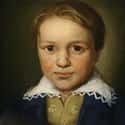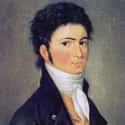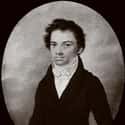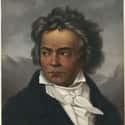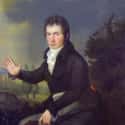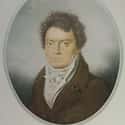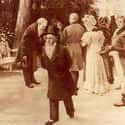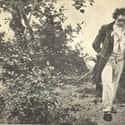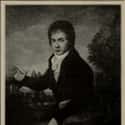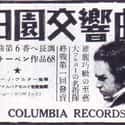-
(#1) His Alcoholic Father Abused And Berated Him In An Attempt To Make Him The Next Mozart
Beethoven was born on December 16, 1770 in Bonn, present day Germany. His grandfather, also named Ludwig van Beethoven, was a kapellmeister (conductor) and Bonn's most respected musician. Unfortunately, Beethoven's father, Johann, was an abusive alcoholic intent on turning his son into a musical prodigy akin to Mozart.
Legend has it, as a very small child, Beethoven was forced to stand on a stool so he could reach the piano keyboard. His father routinely beat and whipped him for mistakes or lack of attentiveness. Johann arranged a public recital for his son on March 26, 1778, billing him as six years old when Ludwig was seven. Though a competent musician, Beethoven never received the same early acclaim as Mozart, which frustrated his father to no end.
-
(#2) His Tutor, Tobias Pfeiffer, Was A Weirdo Who Made Him Practice In The Middle Of The Night
In 1779, when Beethoven was nine years, an eccentric musician named Tobias Friedrich Pfeiffer moved into the Beethoven household. Pfeiffer had recently moved to Bonn and befriended Ludwig's father, who thought Ludwig could benefit from Pfeiffer's tutelage.
Pfeiffer taught Beethoven for one year, during which time he recognized Ludwig's talent and helped him improve greatly as a musician. However, he was apparently a very disagreeable man with a habit of forcing Ludwig to practice at strange hours. According to some sources, Pfeiffer was an insomniac, and would drag Beethoven out of bed in the middle of the night for lessons.
Beethoven biographer Tilman Skowroneck argues Pfeiffer was a positive influence on Ludwig the musician and composer, despite the negative effects he had on the young boy's psyche. According to primary sources Skowroneck cites, Pfeiffer was a gifted musician and the primary source of Beethoven's formal musical education as a child.
-
(#3) He Was Dyslexic, Never Learned To Multiply Or Divide, And Had Difficulty With Music Theory
Beethoven had serious learning disabilities. Even as an adult, he couldn't multiply or divide simple sums. If he had to figure out 12 x 2, for example, he wrote down twelve twos and added manually. Because he dropped out of traditional school at 10, Beethoven never learned the fundamentals of mathematics and, even in his last days, couldn't handle fundamental tasks involving words and numbers (spelling was also difficult for him.). Aware of this inability, he commented, "Music comes to me more readily than words."
Despite these issues, Beethoven never gave up on tasks he wanted to pursue or things he felt compelled to understand. According to biographer JR Ruciman, the composer had great difficulty understanding counterpoint in music, but refused to give up pursuing it, and eventually came to master it. Unlike Mozart or Handel, Beethoven was a very slow thinker, but once he came to understand something, he understood it completely, and would never budge on the conclusions he drew, no matter how profound an argument was made against him. Even composing was laborious for Beethoven, but he never gave up.
-
(#4) His Father's Alcoholism Forced Beethoven To Support Himself In His Early Teens
Beethoven's father was a tenor and musician employed in the court orchestra at Bonn. He was competent and punctual until drinking harmed his voice and ruined his reputation. In the early 1780s, his standing, already in decline, was further tarnished when he was caught in a forgery scandal. Although he wasn't prosecuted, his music career deteriorated completely and he became a notorious, undesirable figure.
At least once, Ludwig had to intercede with police to prevent his father's arrest for public intoxication. Beethoven understood from a young age he would have to earn a living for himself, as he couldn't rely on his father. In 1784, at age 14, he was appointed Elector of Cologne's Assistant Official Court Organist, and received a modest salary. Beethoven's mother died in 1787. His father got a salary as an act of charity and, in 1789, Beethoven obtained court permission to directly receive half his father's salary for household expenses, as he was essentially now supporting the family (he had two younger brothers, the only of his seven siblings to survive infancy).
At some point, the court officially banished Johann von Beethoven from Bonn, although this demand was never enforced. Ludwig left his hometown in late 1792 for Vienna. His father died a month afterwards on December 18, 1792.
-
(#5) His Mistrust Of Father Figures Ruined His Relationship With Mentor Haydn
As a young man, Beethoven was mentored by Austrian composer Joseph Haydn, who was by all accounts a kind man. Childless, Haydn saw himself as a father figure; in addition to helping Beethoven as a composer, he offered advice and guidance, and passed Beethoven's work around to all the right people. He expected Beethoven would "in time fill the position of one of Europe’s greatest composers," called his protégée "my dear pupil Beethoven," and once wrote "‘I shall be proud to call myself his teacher; I only wish that he might remain with me a little while longer."
While Beethoven was polite to Haydn, his inherent mistrust of father figures made him incredibly suspicious of his mentor's motives. According to Oxford University Press, Beethoven saw Haydn, a musical genius himself, as a rival as much as a mentor. His mistrust eventually turned to paranoia; he suspected Haydn "was not well minded" towards him, and developed an unfounded theory that Haydn was sabotaging his development.
Eventually, Haydn left Vienna and passed Beethoven off to another mentor, though their relationship had fractured before that, thanks to the latter's skepticism.
-
(#6) He Was A Slob, Dressed Poorly, And Was Difficult Very To Get Along With
Beethoven's personality, comportment, and hygiene left a lot to be desired, judging from some of the quotes about him. "As a young man, Beethoven was frank to the point of rudeness. Headstrong and proud, he was never willing to conform in his behaviour..."
Of course, being desperately alone and beaten by your alcoholic father for much of your childhood might do that to you. Another revealing comment came from a visitor to Beethoven's home:
"Picture to yourself the dirtiest, most disorderly place imaginable - blotches of moisture covered the ceiling, an oldish grand piano, on which dust disputed the place with various pieces of engraved and manuscript music; under the piano (I do not exaggerate) an unemptied pot de nuit; ... the chairs, mostly cane-seated, were covered with plates bearing the remains of last night's supper and with wearing apparel etc."
Beethoven seems anything but a smooth sophisticate:
"Beethoven was most awkward and bungling in his behaviour; his clumsy movements lacked all grace. He rarely picked up anything without dropping or breaking it... Everything was knocked over, soiled, or destroyed. How he ever managed to shave himself at all remains difficult to understand, even considering the frequent cuts on his cheeks. - He never learned to dance in time with the music."
-
(#7) Most Of His Close Friendships Were Mired By His Inability To Understand Human Behavior
According to Grove Music Online, a digital resource of Oxford University Press, Beethoven was incredibly impatient and mistrustful. These qualities, combined with a pronounced inability to discern motive, put tremendous strain on many of the composer's personal relationships. Compounded misunderstandings, exacerbated by Beethoven's temper, led to serious, long-lasting arguments and, in some cases, fist fights.
A look at Beethoven's pattern of friendship shows the effect his mistrust and skepticism. His two closest friends - Franz Gerhard Wegeler, a physician Beethoven knew since childhood, and theologian Carl Amenda - lived in different countries for most of their adult lives. Stephan von Breuning was his closest friend in Vienna, and he and Beethoven went through years of not talking to one another due to tension in their relationship.
-
(#8) He Never Married, But Not For Lack Of Trying
Ludwig van Beethoven never married. He proposed marriage to several women, though was rejected by all of them. Among other reasons for these rejections was his physical appearance. Countess Julia Guicciardi, a piano pupil in her teens and the object of the Sonata No. 14 in C-Sharp Minor (Moonlight), described Beethoven as "very ugly, but noble..." Yeah, sure, musical genius. But dag, so fugly.
Of course, looks aren't everything. Beethoven was also arrogant and unpleasant. In 1810, he was romancing Therese Malfatti, long-rumored to be the inspiration for Beethoven's Bagatelle No. 25 in A minor (Fur Elise). As things heated up between them, Beethoven contemplated a marriage proposal, but was banned from the Malfatti household for offending everyone in it.
There also was the matter of social class. Beethoven circulated in high society, so he was exposed to woman with titles and wealth. Even though he achieved great success, he was a musician and, therefore, in the early 19th century, still thought of as a veritable servant.
-
(#9) The Love Of His Life Died Alone After Refusing Marriage For Class-Based Reasons
Despite his clumsiness and failure with women, Beethoven was a man of occasional grand gestures. When he died in 1827, a remarkable love letter was found in his personal papers. It must have been very important to him, as it was written in July 1812 and was still with him 15 years later, despite his habit of changing homes constantly. The letter contains such phrases as "remain my true and only treasure, my all, as I to you." and the famous phrase: "Even in bed my ideas yearn towards you, my Immortal Beloved, here and there joyfully, then again sadly, awaiting from Fate, whether it will listen to us."
The letter was discovered by Beethoven's secretary and first biographer Anton Schindler, who willed it to his sister, who in turn sold it to the Berlin State Library, where it resides today. The most likely candidate for the "Immortal Beloved" is Countess Josephine Brunsvik, a married woman who was involved with Beethoven but rejected marriage that would have cost her custody of her children. She died tragically in 1821, abandoned by her family. In the year of her death, Beethoven composed his last piano sonatas, Op. 110 and Op. 111, believed by some to be requiems for Brunsvick.
-
(#10) He Started Going Deaf At The Same Time He Became Immensely Popular
Beethoven's move to Vienna was a wise decision. He studied with the most respected composer of the period, Joseph Haydn, and generated enough support from Viennese patrons to cut ties with Bonn. His first public performance in Vienna, in March 1795, and subsequent published pieces, were a resounding success. His Symphony No 1 in C major, performed in Vienna in April 1800, made him one of Europe's most famous composers.
Yet as he rode the gilded rocket of fame ever upward in the skies of European celebrity, Beethoven was grappling with a terrible secret: he was rapidly losing his hearing. The deterioration was so rapid, he could barely hear words in a normal conversation at the age of 30. In a letter from 1801, he wrote:
"I must confess that I lead a miserable life. For almost two years I have ceased to attend any social functions, just because I find it impossible to say to people: I am deaf. If I had any other profession, I might be able to cope with my infirmity; but in my profession it is a terrible handicap."
Despite his worsening handicap, Beethoven enjoyed the most productive period of his life from 1803 until 1812, composing an opera, six symphonies, four solo concerti, five string quartets, six string sonatas, seven piano sonatas, five sets of piano variations, four overtures, four trios, two sextets, and 72 songs. This flurry of activity ranks as one of the most productive periods in the life of any musician. That Beethoven accomplished it while practically deaf is truly remarkable.
-
(#11) His Brother Died Young And His Attempts To Raise His Nephew Created Family Turmoil
When Beethoven's brother, Carl, died from tuberculosis in 1815, Ludwig attempted to get custody of his nine-year-old nephew, Karl (very imaginative naming, Carl). He considered his late brother's wife an unfit mother; she had an illegitimate child with another man before her marriage and was convicted of theft. On top of this, Carl stipulated in his will that he would like Ludwig and his wife to share custody of Karl.
Although Beethoven was successful in gaining custody, the case dragged on until 1820. In the end, he had a contentious relationship with Karl, who couldn't fulfill his uncle's desire to pursue a music career because he had no musical talent. Karl's suicide attempts and frequent requests to be taken to his mother's home devastated Beethoven. The final nail in the coffin was his decision to join the military.
In January 1827, Karl enlisted in the Austrian army, unemotionally bidding farewell to his uncle. Beethoven died two months later. Karl van Beethoven died of liver disease in 1858, at 52. Despite the tension in their relationship, Karl was present at, and participated in, his uncle's funeral.
-
(#12) He Stopped Performing Publicly After Bungling His Own Piece Because Of His Hearing Loss
In the early days of his career, Beethoven was known as a skilled concert pianist with a remarkable talent for improvisation. Because live performances were lucrative, he attempted to play in front of a paying crowd well after he had lost much of his hearing. A failed attempt to play his Piano Concerto No.5 (Emperor) in 1811 was the last time he performed in public.
Though he never performed publicly after that, he appeared on stage for the premiere of his Ninth Symphony in Vienna on May 7, 1824.
-
(#13) He Used, Among Other Methods, A Vibrating Pencil To Help Compose While Deaf
Beethoven started to have issues with his hearing in 1800, at the age of 30. Although there are many theories as to what caused this disability, not even his autopsy disclosed the source of Beethoven's hearing loss. His condition began with a buzzing, ringing sound that only got steadily worse. He was able to continue composing music because his deafness was a slow deterioration, not a sudden occurrence.
But how did he do it? Beethoven's servants observed him at the piano with one end of a pencil in his mouth. The other end of the pencil, resting on the piano's soundboard, sent vibrations from the instrument to the composer, which helped him discern notes. Beethoven's deafness influenced the music he composed; his late work is dominated by low notes, which he could still hear clearly. However, high notes chime in his final compositions as well, though he could only hear them in his imagination.
-
(#14) His Disdain For Authority And Pretense Ruined His View Of A Literary Hero
Beethoven was naturally predisposed to resisting authority. Like many of his generation, he was ideologically influenced by the French Revolution. He hated being told what to do and disdained all forms of social pretense or hierarchy. If asked to perform at a social gathering, he would resolutely refuse and, in some cases, storm out. His refusal to follow the norms of bourgeoisie and aristocratic etiquette was so profound, Archduke Rudolph, a patron of the arts and supporter of Beethoven, exempted him from the rules of the court.
This stubbornness also applied to Beethoven's conception of himself as an artist, and his ideas of the role of the artist in society. In his mind, the artist stood apart from all others, a special class of people endowed with special gifts. He dubbed himself a Tondichter ("poet of sound") and accorded the same respect and status to fellow artists. His image of artists worked against him in some instances, though. When Beethoven met Johann Wolfgang von Goethe, who he esteemed as the greatest of poets, he was disturbed to see the writer behaving deferentially with royals. This ruined his conception of Goethe.
-
(#15) For A Change of Pace, The Premiere Of Beethoven's Ninth Was Remarkably Poignant
In 1824, Beethoven wished to premiere his Symphony No. 9 in D minor, Op. 125 (Choral) in Berlin. He felt Vienna had become more hospitable to Italian composers, and his style of music would be more appealing elsewhere. He relented when a petition signed by fellow musicians and arts patrons urged him to change his mind. The premiere was set for May 7, 1824.
The performance was set to be Beethoven's first stage appearance in more than a decade, and would require the largest orchestra yet assembled by the composer. It was also one of the longest, most complex symphonies yet written, and the only symphony by a major composer to incorporate vocal work. While Beethoven was officially the conductor, another conductor, Michael Umlauf, was also on stage. It's believed the musicians were instructed to ignore Beethoven. According to one of the musicians in the orchestra:
“...he stood in front of the conductor’s stand and threw himself back and forth like a madman. At one moment he stretched to his full height, at the next he crouched down to the floor. He flailed about with his hands and feet as though he wanted to play all the instruments and sing all the chorus parts.”
There are many anecdotes about the performance, most probably apocryphal, but there is no question the piece was a tremendous success. As the final notes faded from the air, Beethoven was focused on the orchestra and unable to hear the tumultuous applause. A member of the chorus turned him around so he could observe the jubilation. The were five separate ovations, and waving hats and handkerchiefs and a sea of raised hands were on display to ensure the composer knew how much the audience loved his work.
-
(#16) He Was A Heavy Drinker And Died In Agony, But No One's 100% Sure About What Killed Him
Beethoven's maternal grandmother and father were alcoholics, so it's not surprising his autopsy showed he died from cirrhosis of the liver. In his final days, he suffered from ascites, an accumulation of fluid in the abdominal cavity, a result of cirrhosis that causes gross swelling. Yet cirrhosis has numerous causes, so which one did Ludwig have?
As an adult, Beethoven drank every day, concluding each evening with a trip to the local tavern. Among other beverages, he drank a lot of wine, which at the time was laced with lead to provide cheap product with a better taste (the practice was illegal even then, but still widespread). Beethoven's chronic drunkenness probably explained his mood swings, hostility, and depression. Coincidentally, his nephew, Karl, also died at a young age from liver-related complications.
Of course, not everyone agrees with the death-by-alcoholism diagnosis. According to a New York Times article from 2010, while Beethoven was certainly ill and suffering from liver problems, there has yet to appear irrefutable evidence of his exact cause of death.
-
(#17) No One Knows What His Last Words Were But There Are Some Wild Theories
Beethoven died on March 26, 1827. There are major discrepancies as to who was present, what was said by Beethoven, and even his state of mind. One biographer's account uses the weather and composer's final moments to create a bombastic drama in keeping with the tone of Beethoven's music:
"At this startling, awful peal of thunder, the dying man suddenly raised his head from Hüttenbrenner's arm, stretched out his own right arm majestically—like a general giving orders to an army. This was but for an instant; the arm sunk back; he fell back; Beethoven was dead."
Several last words are attributed to Beethoven; which ones you read all come down to the source you're reading. One account has him saying "Pity, Pity - too late," upon hearing about a gift of a case of wine from his publisher.
"Applaud, my friends, the comedy is over," spoken in Italian to mimic the Commedia dell'arte, seems like a stretch for a dying man, but someone claims he said it. He may also have uttered "I shall hear in heaven." certainly appropriate final words for him.
-
(#18) Almost 100 Years After Beethoven's Death, German POWs Brought His Music to Japan
Not a sad fact from the life of Beethoven, but strange enough to merit mentioning, is the way in which the composer became a cultural staple in Japan.
Japan wasn't exposed to any Western classical music until the end of the 19th century, and Beethoven's music didn't make there until WWI. Japan, siding with Britain and the Allies in that war, demanded Germany surrender a base in Qingdao, China, a port city on the Yellow Sea. Germany refused, so the Japanese seized it, capturing 4,000 POWs.
A thousand of these Germans were sent to Naruto, Japan, where they spent their time as productively as possible. A group of them formed an orchestra and performed various pieces, with a focus on Beethoven. On June 1, 1918 the orchestra publicly performed Beethoven's Ninth for the first time on the continent of Asia. Since that first performance, the piece has achieved such stature in Japan it is considered an iconic and indelible part of Japanese culture, despite being German.
It is now a tradition for Japanese orchestras to play the Ninth at some point in December. There are several explanations for this, one being musicians face financial difficulties at year end and know a performance of the Ninth will sell out. Unique to the Japanese tradition, the audience frequently sings the "Ode to Joy" chorale in German along with the choir Typically, Beethoven's Ninth will be performed hundreds of times in December by orchestras all across Japan, with many playing its final note as the New Year begins.
New Random Displays Display All By Ranking
About This Tool
Beethoven has been away for more than 200 years, almost everyone in the world knows his name and music. All the modern musicians are still fascinated by his beautiful music and touching melody, but few people know how tragic his life has been. Beethoven spent his childhood under the strict and demanding education of his father, which created his stubborn, sensitive personality. When his music career began to develop, he was hit by fate again, he was deaf.
He has almost never heard of his own work. After his deafness, he tried his best to avoid any social activities. If a musician cannot hear his own work, what could be more cruel torture? The random tool shares 18 sad facts about the miserable life of Beethoven.
Our data comes from Ranker, If you want to participate in the ranking of items displayed on this page, please click here.











